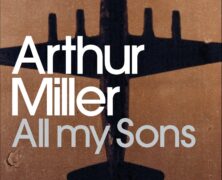Kick against the pond That fetid green; Close your eyes in the sun. Light appears from the weir And you remember Summer days: The strange fact of their Pastness, Your licences then – and now....
Flash Fiction: Back Then...
posted by Cloud
My father worked in an ice-cream factory. That’s where he went most days. When the place closed he drank. Then he took off to London. For three years my mother made toast. She drank. My father would call at Christmas from Crouch End. When he came back he bought a Morris Minor. There weren’t guards on the road back then. He drove drunk every night. The freedom. The boys’ club dances were only for grown men. But drink wasn’t allowed in the Lilac – just priests and tea and biscuits. The cars were steamed up afterwards; reminded me of greenhouses....
Flash Fiction: When You’re Leaving...
posted by Cloud
I saw that shape again, the one I told you about. Why was I telling you? Maybe you were interested and would have liked to hear more, but what difference does it make anyway when you’re leaving? I stood watching it for a long time. I think it’s a man taking the fish. I haven’t told my father. His fish will be his sole income soon and once the crops fail – and you know they will – the bank will come knocking. All that will be left is the fish. Have you seen him lately? He asks for you. I tell him you are busy with your wife and her illnesses, that you are committed to her. He saw you as the son he might have had. My mother nearly died the night I was born. That was it for her. No more. She looks at me too long. I know she would have preferred it had you married me. Out from under her feet. Maybe it’s for the best. I’ll go to the river tonight and I’ll seduce the poacher of my father’s fish. Maybe he will agree to provide; perhaps he’s in the market for a wife....
All My Sons
posted by Cloud
Arthur Miller took two-and-a-half years to write “All My Sons.” Its creation straddled the end of the Second World War and the inspiration came from his mother-in-law. In the original story a woman informed on her father who had defrauded the military. Miller made the daughter a son, Chris Keller. The story tells of Joe Keller, an armaments producer, who knowingly supplies faulty engine parts to the American Air Force during the war that results in the deaths of twenty-one pilots. Joe allows his neighbour, friend and colleague Steve Deever to take the blame. Deever is disgraced and neither of his children, neither Ann nor George, will acknowledge him. Kate and Joe Keller’s son Larry is missing, presumed dead. It’s been three years, yet his mother refuses to accept the truth; but her reasons are more than mere motherly love. The arrival in town of Larry’s love interest Ann leads to a crisis that threatens to destroy the Kellers. George Deever, her brother, has recently visited his father in prison and objects to plans for Chris and Ann to marry. Miller’s story is an agonising tale about how people will deny the truth in order to survive. It explores the ugly, exploitative practices of industrialists and how family is used as an excuse for criminality. Everybody, it seems, shares in the blame, though to different extents. The example of “All My Sons” may well represent myriad other cases of people’s contempt for the soldiers fighting and dying for vague ideals in far-flung regions, out of sight of the means of production and the day-to-day consumerism of American society. Chris Keller says “there was no meaning in [the war] here; the whole thing to them was a kind of a – bus accident.” He returns to...
THE PROBLEM WITH “AGE OF ULTRON”; or, How Not To Please Everyone – by Cian Morey...
posted by Cloud
I have my reasons for rarely watching superhero movies, particularly Marvel superhero movies. The majority of them, in my opinion, are simply money-spinners tossed out into the cinemas year after year to reel in easy wealth and perhaps to try to convince the Academy to devise a new Oscar for “Most Explosions in a Feature Film.” I have found that they often lack significant character development and forgo emotionally powerful or thought-provoking plots in favour of collapsing half of America’s skyscrapers in extensive climactic battle scenes that drag on for over half an hour. But that’s fine. Superhero movies don’t need character development or fascinating plots. There are enough people out there who are perfectly happy to watch two hours of explosions and loud noises to supply Marvel and company with more money than they could ever need. Marvel, therefore, should stick to doing what they do best. They should focus on creating the most exciting, explosive romps in the history of cinema. They don’t need to worry about those who would prefer some interesting characters or intriguing plotting; after all, those people are far from their biggest source of income. But nothing, I am afraid, annoys me more than when a half-hearted attempt is made at satisfying both parties. Avengers: Age of Ultron had a spectacular premise (and yes, from here on there are spoilers). Tony Stark, obsessed with protecting the world following the alien invasion in the previous movie, creates the perfect global defence program, an artificial intelligence by the name of Ultron. However, Ultron sees from plentiful records of war and so on that the greatest threat to the world is, in fact, the human race itself, and, having been programmed to eradicate the greatest threats to world, sets off to...





